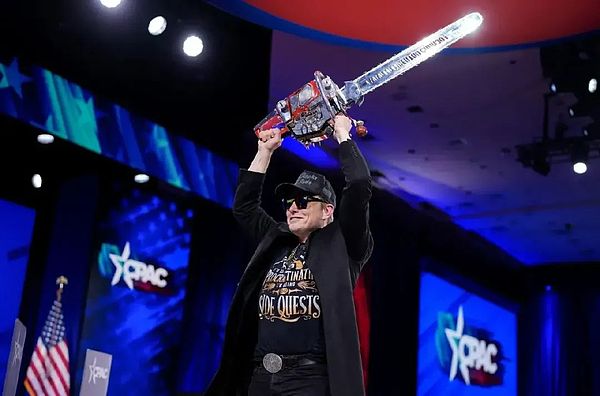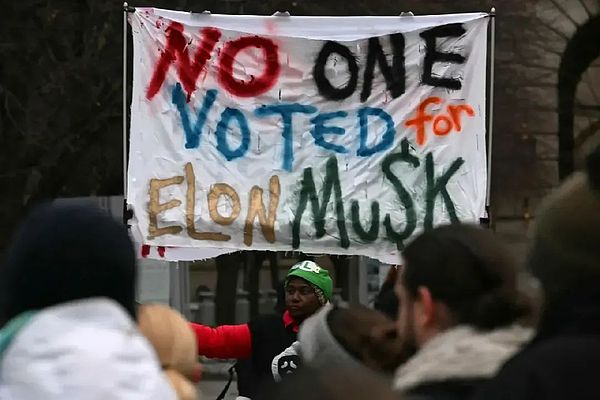While Elon Musk’s Department of Government Efficiency (DOGE) is hitting federal agencies with budget cuts and layoffs, Tesla and SpaceX, the cornerstones of Musk’s vast wealth, are still enjoying the benefits of public funds. Without these public funds, they may not succeed.
Original title: "Elon Musk: Billionaire Vampire Sucking Federal Welfare"
At the behest of Trump, the South African-born billionaire is pushing a massive and unsystematic campaign to cut excessive government spending. But he is one of the biggest beneficiaries of federal support in history. His business empire is built on this support.
In the past 15 years alone, Musk’s $1.1 trillion Tesla and $350 billion SpaceX have absorbed as much as $30 billion in public funds. Meanwhile, Musk’s personal wealth has ballooned, from $2 billion in 2012 to more than $400 billion last December; today he’s worth $393 billion. Thirteen years ago, the world’s richest man wasn’t even a billionaire.
In 2012, Republican presidential candidate Mitt Romney called Musk a “crony capitalist,” but the financial favors his company has received for so long are hard not to associate with another Republican term for people who live off public funds. In the years that followed, Musk’s companies developed a symbiotic relationship with federal programs that made him increasingly like a “vampire.” Here’s what’s going on:
· SpaceX has won $22 billion in contracts from the Department of Defense and NASA for rocket launches, satellite deliveries, missions to ferry astronauts and supplies to the International Space Station, and Starlink services, according to SpaceX President Gwynne Shotwell (though a review of public data puts the figure at $20 billion).
· Since 2008, Tesla has sold $11.7 billion in regulatory credits, at least $4 billion of which came from automakers that needed to comply with U.S. Corporate Average Fuel Economy (CAFE) rules.
· In 2009, the U.S. government provided Tesla with a $465 million federal loan guarantee, helping the then-struggling startup acquire its first factory (a transfer from Toyota).
· Tesla’s charging network received at least $31 million in federal funding under a program that Trump recently canceled.
· Tesla buyers have been the biggest beneficiaries of a $7,500 electric vehicle tax credit, receiving about $4 billion since the Obama era. That benefit could also be eliminated under Trump.
· Tesla was once considered a likely winner of a $400 million contract to provide armored electric vehicles to the State Department, but the agency later suspended its plans.
Musk has relied on government funds for years to grow and expand his company, and his DOGE has brought the "move fast and break things" approach to government.
DOGE claimed to have cut federal spending by $55 billion (which it could not confirm) and fired at least 200,000 government workers, including those at the Federal Aviation Administration (FAA) and experts in nuclear weapons safety or trying to prevent an avian flu pandemic, though many of them were quickly recalled. Norman Eisen, a senior fellow at the left-leaning Brookings Institution who is involved in a lawsuit on behalf of federal employees seeking to stop DOGE from carrying out what they see as unconstitutional actions, found the situation alarming.
It is the height of hypocrisy that Musk is now undermining the federal government after his companies have received massive support from it for years, Eisen told Forbes. Worse, in the long run, the ongoing partnership between his business enterprises and the U.S. government raises a host of serious conflict of interest issues never before seen.”

Tesla and SpaceX CEO Elon Musk walks off the stage at the Conservative Political Action Conference in Oxon Hill, Maryland, wielding a chainsaw. Image credit: Getty Images
Musk did not immediately respond to a request for comment for this story. DOGE also has no designated public spokesperson.
“As for concerns about conflicts of interest between Elon Musk and DOGE, President Trump has stated that he will not allow conflicts of interest to arise, and Elon has committed to recuse himself when conflicts of interest may arise,” White House press secretary Karoline Leavitt said in an emailed statement.
Musk has cultivated an image as a risk-taking entrepreneur who is arguably one of the most successful entrepreneurs of the 21st century so far.
However, despite his creativity and drive, his business empire would not have been as large as it is today without strong federal support.
Federal funding helped Tesla and SpaceX gain footholds when they were fledgling, untested startups 15 years ago. In Tesla’s case, the company nearly filed for bankruptcy in late 2008, but an Advanced Technology Vehicle Manufacturing (ATVM) loan from the U.S. Department of Energy was its lifeline. The loan was at a low interest rate, and Tesla would not have been able to build its first factory so cheaply and quickly if it had relied solely on private funds. It also enabled Tesla to launch the groundbreaking Model S sedan on time in 2012, laying the foundation for its future success.
Without DOGE and the federal programs that Trump is now busy canceling, Musk would most likely not have amassed such a huge fortune.
And SpaceX didn’t start sending rockets into orbit until 2008 after many failures. It also wouldn’t have become NASA’s most important provider of cargo and crew launch services if it hadn’t won a life-changing $1.6 billion contract that year. Both companies faced uncertain futures, but the government’s risky investment eventually paid off.
Today, Tesla is the world’s most valuable automaker, with a market value of $1.16 trillion.With an estimated value of $350 billion, SpaceX is the world’s most valuable private startup. So without DOGE and the federal programs Trump is now busy canceling, his massive $393 billion fortune (estimated by Forbes based on Musk’s holdings in these companies) would most likely not have been possible. Controlling government spending and improving efficiency have been bipartisan concerns for decades. While there have been many initiatives to address these issues, they seem to be getting worse over time. One big difference during the Trump administration is that for the first time in U.S. history, the cost-saving work has been completely outsourced to a billionaire entrepreneur. In addition to Trump’s attempt to cancel all future grants and funding for Biden’s Inflation Reduction Act and the Bipartisan Infrastructure Act (which could include $4 billion in federal funding for California’s high-speed rail project), Musk’s DOGE team is making sweeping cuts to federal agencies. So far, there is no clear sign that they are being thoughtful in their cuts.
As it stands, DOGE has developed a "shoot first, ask questions later" style of operation, which is exactly the same as Musk's approach when he drastically laid off 80% of Twitter's employees after acquiring it in 2022. In addition to some embarrassing and ill-considered layoffs in its first few weeks, DOGE has been criticized for multiple measures, including suspending research grants from the National Institutes of Health (NIH) (which may slow the pace of medical breakthroughs), drastically cutting most of the budget and staff of the United States Agency for International Development (USAID) (resulting in food and medical supply disruptions to developing countries), eliminating the Consumer Financial Protection Bureau, reducing the staff of the Internal Revenue Service (IRS) just in time for tax season, cutting seasonal staff at national parks, and possibly eliminating the Department of Education (including cutting important funds that go to the poorest school districts in the United States).

A protester during a demonstration against US President Donald Trump and Elon Musk's government efficiency department policies in Washington. Image source: AFP via Getty Images
But even Trump supporters like Kash Patel, who has been confirmed by the Senate to serve as FBI director, have pointed out that Musk has benefited greatly from federal contracts. "We're all paying for it. That's why he's so rich," he said in a December 2021 interview with Fox News about SpaceX's Starlink service.

Although Musk has been the public face of DOGE and his efforts have been praised by Trump, a federal lawyer claimed last week that Musk was not strictly speaking the head of the cost-cutting project and that he "did not have actual power to make government decisions himself." His status is an unpaid special government employee. But because Musk has a contract with the government through SpaceX, DOGE has unrestricted access to databases of agencies including the Treasury Department, the Social Security Administration, the IRS and the Department of Defense, which is disturbing.
Russel Honoré, a retired U.S. Army lieutenant general, told Forbes: "He's a government contractor himself, how can they give him access to where all the contracts are stored? I think it must be illegal."
Trump's staff also said they relied on Musk to identify any potential conflicts of interest on his own. But for Eisen, who was a government ethics expert in the Obama administration and served as co-counsel to the House Judiciary Committee during Trump's first impeachment, that's not enough.
Eisen said: "Despite his claims of transparency, there are a lot of questions we don't know the answers to, such as what precautions he took when he was working on a particular matter to ensure that he had no personal financial interest in it."
The impact of DOGE's actions is far from clear. Still, many agencies have been forced to make painful cuts that could soon affect more Americans, especially low-income groups, as well as cities, states and school programs that rely on federal money to operate. So far, Congress, which once set up those programs and approved the funding, has not intervened.
Eisen, a former U.S. ambassador to the Czech Republic, said it was worrisome that a billionaire like Musk, who has taken huge sums from government programs and donated at least $200 million to help Trump get elected in 2024, is now making drastic cuts to federal agencies with questionable legal authority.
“The same tycoons who once benefited from government largesse are now spending hundreds of millions of dollars to support a candidate who, once elected, is letting them participate in government decision-making, creating all kinds of conflicts of interest,” he said. “There’s a word for this: oligarchic. We are witnessing the formation of an oligarchy in the United States, and it should be a cause of deep concern to Americans.”
This article is translated from:
https://www.forbes.com/sites/alanohnsman/2025/02/21/elon-musk-is-a-billionaire-federal-welfare-vampire/
Text: Ohnsman
 Anais
Anais






